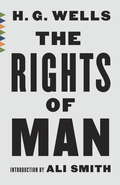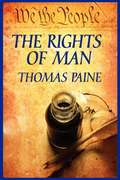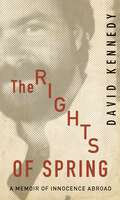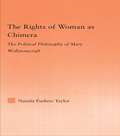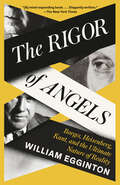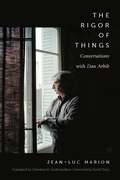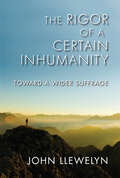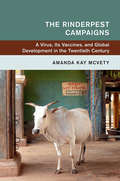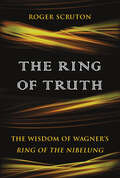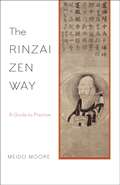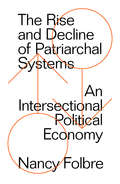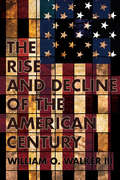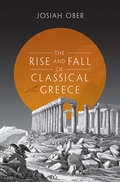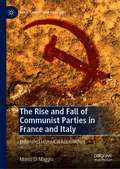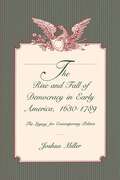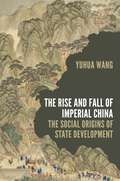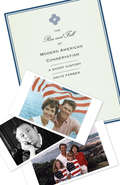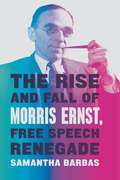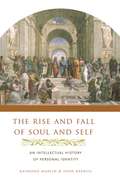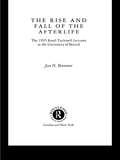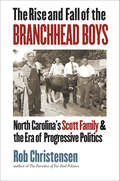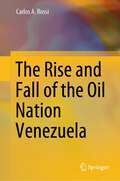- Table View
- List View
The Rights of Man
by H. G. WellsH. G. Wells’s passionate and influential manifesto—never before available in the United States—was first published in England in 1940 in response to World War II. The progressive ideas Wells set out were instrumental in the creation of the UN’s Universal Declaration of Human Rights, the European Convention on Human Rights, and the UK’s Human Rights Act. In the face of a global miscarriage of justice, The Rights of Man made a clear statement of mankind’s responsibilities to itself. Seventy-five years later we are again witnessing a humanitarian crisis, with human rights in developed nations under threat and millions of refugees displaced. A new introduction to Wells’s work by award-winning novelist Ali Smith underlines the continuing urgency and relevance of one of the most important humanitarian texts of the twentieth century.
The Rights of Man
by Thomas PaineIn The Rights of Man, Thomas Paine defends the representational form of government. He posits that all men are born with God-given rights that cannot be taken from them by any government. Paine's position on inalienable rights played a major role in the Bill of Rights being included in the Constitution. This seminal work is as pertinent today as when it was first written.
The Rights of Spring: A Memoir of Innocence Abroad
by David KennedyAna reported being blindfolded, doused in cold water. She was tied to a metal frame; electrodes were fastened to her body. Someone cranked a hand-operated generator. One spring more than twenty years ago, David Kennedy visited Ana in an Uruguayan prison as part of the first wave of humanitarian activists to take the fight for human rights to the very sites where atrocities were committed. Kennedy was eager to learn what human rights workers could do, idealistic about changing the world and helping people like Ana. But he also had doubts. What could activists really change? Was there something unseemly about humanitarians from wealthy countries flitting into dictatorships, presenting themselves as white knights, and taking in the tourist sites before flying home? Kennedy wrote up a memoir of his hopes and doubts on that trip to Uruguay and combines it here with reflections on what has happened to the world of international humanitarianism since. Now bureaucratized, naming and shaming from a great height in big-city office towers, human rights workers have achieved positions of formidable power. They have done much good. But the moral ambiguity of their work and questions about whether they can sometimes cause real harm endure. Kennedy tackles those questions here with his trademark combination of narrative drive and unflinching honesty. This is a powerful and disturbing tale of the bright sides and the dark sides of the humanitarian world built by good intentions.
The Rights of Woman as Chimera: The Political Philosophy of Mary Wollstonecraft (Studies In Philosophy Ser.)
by Natalie TaylorThe Rights of Woman as Chimera examines Mary Wollstonecraft's intellectual relationship to Rousseau, Locke, and Aristotle. Although she learned much from each philosopher, her own thought cannot be said to be simply derivative of these thinkers. In considering "the woman question," Wollstonecraft levels important, but friendly, critiques of her male predecessors. She puts forth a conception of the nature of woman, which is informed by and consistent with her larger political philosophy, and this study endeavors to outline this conception of the nature of woman.
The Rigor of Angels: Borges, Heisenberg, Kant, and the Ultimate Nature of Reality
by William EggintonA NEW YORK TIMES AND NEW YORKER BEST BOOK OF THE YEAR • A poet, a physicist, and a philosopher explored the greatest enigmas in the universe—the nature of free will, the strange fabric of the cosmos, the true limits of the mind—and each in their own way uncovered a revelatory truth about our place in the world&“[A] mind-expanding book. . . . Elegantly written.&” —The New York Times&“A remarkable synthesis of the thoughts, ideas, and discoveries of three of the greatest minds that our species has produced.&” —John Banville, The Wall Street JournalArgentine poet Jorge Luis Borges was madly in love when his life was shattered by painful heartbreak. But the breakdown that followed illuminated an incontrovertible truth—that love is necessarily imbued with loss, that the one doesn&’t exist without the other. German physicist Werner Heisenberg was fighting with the scientific establishment on the meaning of the quantum realm&’s absurdity when he had his own epiphany—that there is no such thing as a complete, perfect description of reality. Prussian philosopher Immanuel Kant pushed the assumptions of human reason to their mind-bending conclusions, but emerged with an idea that crowned a towering philosophical system—that the human mind has fundamental limits, and those limits undergird both our greatest achievements as well as our missteps.Through fiction, science, and philosophy, the work of these three thinkers coalesced around the powerful, haunting fact that there is an irreconcilable difference between reality &“out there&” and reality as we experience it. Out of this profound truth comes a multitude of galvanizing ideas: the notion of selfhood, free will, and purpose in human life; the roots of morality, aesthetics, and reason; and the origins and nature of the cosmos itself. As each of these thinkers shows, every one of us has an incomplete picture of the world. But it's only as mortal, finite beings are we able to experience the world in its richness and breathtaking majesty. A soaring and lucid reflection on the lives and work of Borges, Heisenberg, and Kant, The Rigor of Angels movingly demonstrates that the mysteries of our place in the world may always loom over us—not as a threat, but as a reminder of our humble humanity.
The Rigor of Things: Conversations with Dan Arbib
by Jean-Luc Marion Dan ArbibIn a series of conversations, Jean-Luc Marion reconstructs a career’s path in the history of philosophy, theology, and phenomenology. Discussing such concepts as the event, the gift, and the saturated phenomenon, Marion elaborates the rigor displayed by the things themselves. He discusses the major stages of his work and offers his views on the forces that have driven his thought.The conversation ranges from Marion’s engagement with Descartes, to phenomenology and theology, to Marion’s intellectual and biographical backgrounds, concluding with illuminating insights on the state of the Catholic Church today and on Judeo-Christian dialogue. Marion also reflects on the relationship of philosophy to history, theology, aesthetics, and literature. At the same time, the book provides an account of French intellectual life in the late twentieth century. In these interviews, Marion’s language is more conversational than in his formal writing, but it remains serious and substantive. The book serves as an excellent and comprehensive introduction to Marion’s thought and work.
The Rigor of a Certain Inhumanity: Toward A Wider Suffrage (Studies In Continental Thought Ser.)
by John LlewelynFocusing on the idea of universal suffrage, John Llewelyn accepts the challenge of Derrida's later thought to renew his focus on the ethical, political, and religious dimensions of what makes us uniquely human. Llewelyn builds this concern on issues of representation, language, meaning, and logic with reflections on the phenomenological figures who informed Derrida's concept of deconstruction. By entering into dialogue with these philosophical traditions, Llewelyn demonstrates the range and depth of his own original thinking. The Rigor of a Certain Inhumanity is a rich and passionate, playful and perceptive work of philosophical analysis.
The Rinderpest Campaigns: A Virus, Its Vaccines, and Global Development in the Twentieth Century (Global and International History)
by Amanda Kay McVetyAmanda Kay McVety has written the first history of the international effort to eradicate rinderpest - a devastating cattle disease - which began in the 1940s and ended in 2011. Rinderpest is the only other disease besides smallpox to have been eradicated, but very few people in the United States know about it, because it did not infect humans and never broke out in North America. In other parts of the world, however, rinderpest was a serious economic and social burden and the struggle against it was a critical part of the effort to fight poverty and hunger globally. McVety follows the deployment of rinderpest vaccines around the globe, exploring the role of the environment in the understanding of development, internationalism, and national security. She expands the standard Cold War narratives to show how these concepts were framed not only by economic and political concerns, but also by biological ones.
The Ring of Truth: The Wisdom of Wagner's Ring of the Nibelung
by Roger ScrutonThe vital, carefully crafted discussion on Wagner’s masterpiece, offering deep insight into both the work itself and profound perspective on certain key philosophical questions Richard Wagner’s Ring of the Nibelung is one of the greatest works of art created in modern times, and has fascinated both critics and devotees for over a century and a half. No recent study has examined the meaning of Wagner's masterpiece with the attention to detail and intellectual power that Roger Scruton brings to it in this inspiring account. The Ring of Truth is an exploration of the drama, music, symbolism and philosophy of the Ring from a writer whose knowledge and understanding of the Western musical tradition are the equal of his capacities as a philosopher. Scruton shows how, through musical connections and brilliant dramatic strokes, Wagner is able to express truths about the human condition which few other creative artists have been able to convey so convincingly. For Wagner, writes Scruton, the task of art is to “show us freedom in its immediate, contingent, human form, reminding us of what it means to us. Even if we live in a world from which gods and heroes have disappeared we can, by imagining them, dramatize the deep truths of our condition and renew our faith in what we are.” Love, death, sacrifice and the liberation that we win through sacrifice—these are the great themes of the Ring, as they are of this book. Scruton's passionate and moving interpretation allows us to understand more fully than ever how Wagner conveys his ideas about who we are, and why the Ring continues to be such a hypnotically absorbing work.
The Rinzai Zen Way: A Guide To Practice
by Meido MooreThe first accessible beginner's guide to Rinzai Zen practice.The recognition of the true nature of oneself and the universe is the aim of Rinzai Zen—but that experience, known as kensho, is really just the beginning of a life of refining that discovery and putting it into practice in the world. Rinzai, with its famed discipline and its emphasis on koan practice, is one of two main forms of Zen practiced in the West, but it is less familiar than the more prominent Soto school. Meido Moore here remedies that situation by providing this compact and complete introduction to Zen philosophy and practice from the Rinzai perspective. It’s an excellent entrée to a venerable tradition that goes back through the renowned Hakuin Ekaku in eighteenth-century Japan to its origins in Tang dynasty China—and that offers a path to living with insight and compassion for people today.
The Rise and Decline of Patriarchal Systems
by Nancy FolbreA major new work of feminism on the history and persistence of patriarchal hierarchies from the MacArthur Award-winning economistIn this groundbreaking new work, Nancy Folbre builds on a critique and reformulation of Marxian political economy, drawing on a larger body of scientific research, including neoclassical economics, sociology, psychology, and evolutionary biology, to answer the defining question of feminist political economy: why is gender inequality so pervasive? In part, because of the contradictory effects of capitalist development: on the one hand, rapid technological change has improved living standards and increased the scope for individual choice for women; on the other, increased inequality and the weakening of families and communities have reconfigured gender inequalities, leaving caregivers particularly vulnerable.The Rise and Decline of Patriarchal Systems examines why care work is generally unrewarded in a market economy, calling attention to the non-market processes of childbearing, childrearing and the care of other dependents, the inheritance of assets, and the use of force and violence to appropriate both physical and human resources. Exploring intersecting inequalities based on class, gender, age, race/ethnicity, and citizenship, and their implications for political coalitions, it sets a new feminist agenda for the twenty-first century.
The Rise and Decline of the American Century
by William O. Walker IIIIn 1941 the magazine publishing titan Henry R. Luce urged the nation’s leaders to create an American Century. But in the post-World-War-II era proponents of the American Century faced a daunting task. Even so, Luce had articulated an animating idea that, as William O. Walker III skillfully shows in The Rise and Decline of the American Century, would guide United States foreign policy through the years of hot and cold war.The American Century was, Walker argues, the counter-balance to defensive war during World War II and the containment of communism during the Cold War. American policymakers pursued an aggressive agenda to extend U.S. influence around the globe through control of economic markets, reliance on nation-building, and, where necessary, provision of arms to allied forces. This positive program for the expansion of American power, Walker deftly demonstrates, came in for widespread criticism by the late 1950s. A changing world, epitomized by the nonaligned movement, challenged U.S. leadership and denigrated the market democracy at the heart of the ideal of the American Century.Walker analyzes the international crises and monetary troubles that further curtailed the reach of the American Century in the early 1960s and brought it to a halt by the end of that decade. By 1968, it seemed that all the United States had to offer to allies and non-hostile nations was convenient military might, nuclear deterrence, and the uncertainty of détente. Once the dust had fallen on Lyndon B. Johnson’s presidency and Richard M. Nixon had taken office, what remained was, The Rise and Decline of the American Century shows, an adulterated, strategically-based version of Luce’s American Century.
The Rise and Fall of Arab Presidents for Life
by Roger OwenThe monarchical presidential regimes that prevailed in the Arab world for so long looked as though they would last indefinitely-until events in Tunisia and Egypt made clear their time was up. The Rise and Fall of Arab Presidents for Life exposes for the first time the origins and dynamics of a governmental system that largely defined the Arab Middle East in the twentieth century. Presidents who rule for life have been a feature of the Arab world since independence. In the 1980s their regimes increasingly resembled monarchies as presidents took up residence in palaces and made every effort to ensure their sons would succeed them. Roger Owen explores the main features of the prototypical Arab monarchical regime: its household; its inner circle of corrupt cronies; and its attempts to create a popular legitimacy based on economic success, a manipulated constitution, managed elections, and information suppression. Why has the Arab world suffered such a concentration of permanent presidential government? Though post-Soviet Central Asia has also known monarchical presidencies, Owen argues that a significant reason is the “Arab demonstration effect,” whereby close ties across the Arab world have enabled ruling families to share management strategies and assistance. But this effect also explains why these presidencies all came under the same pressure to reform or go. Owen discusses the huge popular opposition the presidential systems engendered during the Arab Spring, and the political change that ensued, while also delineating the challenges the Arab revolutions face across the Middle East and North Africa.
The Rise and Fall of Classical Greece
by Josiah OberLord Byron described Greece as great, fallen, and immortal, a characterization more apt than he knew. Through most of its long history, Greece was poor. But in the classical era, Greece was densely populated and highly urbanized. Many surprisingly healthy Greeks lived in remarkably big houses and worked for high wages at specialized occupations. Middle-class spending drove sustained economic growth and classical wealth produced a stunning cultural efflorescence lasting hundreds of years.Why did Greece reach such heights in the classical period--and why only then? And how, after "the Greek miracle" had endured for centuries, did the Macedonians defeat the Greeks, seemingly bringing an end to their glory? Drawing on a massive body of newly available data and employing novel approaches to evidence, Josiah Ober offers a major new history of classical Greece and an unprecedented account of its rise and fall.Ober argues that Greece's rise was no miracle but rather the result of political breakthroughs and economic development. The extraordinary emergence of citizen-centered city-states transformed Greece into a society that defeated the mighty Persian Empire. Yet Philip and Alexander of Macedon were able to beat the Greeks in the Battle of Chaeronea in 338 BCE, a victory made possible by the Macedonians' appropriation of Greek innovations. After Alexander's death, battle-hardened warlords fought ruthlessly over the remnants of his empire. But Greek cities remained populous and wealthy, their economy and culture surviving to be passed on to the Romans--and to us. A compelling narrative filled with uncanny modern parallels, this is a book for anyone interested in how great civilizations are born and die.This book is based on evidence available on a new interactive website. To learn more, please visit: http://polis.stanford.edu/.
The Rise and Fall of Communist Parties in France and Italy: Entangled Historical Approaches (Marx, Engels, and Marxisms)
by Marco Di MaggioThis book analyzes the dynamics through which the two major communist parties of the capitalist world—which in the 1970s had great influence on their respective national political contexts since the 1980s are increasing their marginality and, although in different forms and with different timeframes are unable to stem the decline of their political and cultural influences on the working classes.
The Rise and Fall of Democracy in Early America, 1630–1789: The Legacy for Contemporary Politics (G - Reference, Information and Interdisciplinary Subjects)
by Joshua MillerThe Rise and Fall of Democracy in Early America describes and explores the emergence of a directly democratic political culture in America, the Federalists' theoretical campaign against that culture, and the legacy of the struggle over democracy for politics today. The Rise and Fall of Democracy in Early America traces the rise of democracy in America beginning with the Puritans of New England; the radicalization during the eighteenth century of Puritan notions of community, autonomy, and participation; and the Antifederalist attempt to preserve a democratic political culture in the face of Federalist efforts to centralize power and distance it from the people by the passage of the 1787 Constitution.Despite its historical concerns, this book is not a history of institutions or a history of ideas. It is a work of political theory that explores certain early American texts and debates, and discusses the theoretical questions raised by those texts and debates, emphasizing those issues most relevant to democratic thought in our own time. Among the many insights into our democratic heritage that Joshua Miller affords us in his discussion of the Puritan theory of membership and the Antifederalist theory of autonomous communities is the hitherto obscured affinity between democracy and conservatism.Whereas many treatments of early American political thought make the debate over the ratification of the Constitution appear dry and abstract, this book shows the clash of political values and ideals that were at the heart of the struggle. It illustrates how the Federalists employed a democratic-sounding vocabulary to cloak their centralizing, elitist designs.Miller introduces readers to a political theory of direct democracy that is presented as an alternative to Marxism, liberalism, and mainstream conservatism. This new democratic theory based on an early American political tradition should serve as a stimulus for rethinking the directions we are taking in politics today.
The Rise and Fall of Imperial China: The Social Origins of State Development (Princeton Studies in Contemporary China #17)
by Yuhua WangHow social networks shaped the imperial Chinese stateChina was the world’s leading superpower for almost two millennia, falling behind only in the last two centuries and now rising to dominance again. What factors led to imperial China’s decline? The Rise and Fall of Imperial China offers a systematic look at the Chinese state from the seventh century through to the twentieth. Focusing on how short-lived emperors often ruled a strong state while long-lasting emperors governed a weak one, Yuhua Wang shows why lessons from China’s history can help us better understand state building.Wang argues that Chinese rulers faced a fundamental trade-off that he calls the sovereign’s dilemma: a coherent elite that could collectively strengthen the state could also overthrow the ruler. This dilemma emerged because strengthening state capacity and keeping rulers in power for longer required different social networks in which central elites were embedded. Wang examines how these social networks shaped the Chinese state, and vice versa, and he looks at how the ruler’s pursuit of power by fragmenting the elites became the final culprit for China’s fall.Drawing on more than a thousand years of Chinese history, The Rise and Fall of Imperial China highlights the role of elite social relations in influencing the trajectories of state development.
The Rise and Fall of Modern American Conservatism
by David FarberThe Rise and Fall of Modern American Conservatism tells the gripping story of perhaps the most significant political force of our time through the lives and careers of six leading figures at the heart of the movement. David Farber traces the history of modern conservatism from its revolt against New Deal liberalism, to its breathtaking resurgence under Ronald Reagan, to its spectacular defeat with the election of Barack Obama. Farber paints vivid portraits of Robert Taft, William F. Buckley Jr., Barry Goldwater, Phyllis Schlafly, Ronald Reagan, and George W. Bush. He shows how these outspoken, charismatic, and frequently controversial conservative leaders were united by a shared insistence on the primacy of social order, national security, and economic liberty. Farber demonstrates how they built a versatile movement capable of gaining and holding power, from Taft's opposition to the New Deal to Buckley's founding of the National Review as the intellectual standard-bearer of modern conservatism; from Goldwater's crusade against leftist politics and his failed 1964 bid for the presidency to Schlafly's rejection of feminism in favor of traditional gender roles and family values; and from Reagan's city upon a hill to conservatism's downfall with Bush's ambitious presidency. The Rise and Fall of Modern American Conservatism provides rare insight into how conservatives captured the American political imagination by claiming moral superiority, downplaying economic inequality, relishing bellicosity, and embracing nationalism. This concise and accessible history reveals how these conservative leaders discovered a winning formula that enabled them to forge a powerful and formidable political majority.
The Rise and Fall of Morris Ernst, Free Speech Renegade
by Samantha BarbasA long-overdue biography of the legendary civil liberties lawyer—a vital and contrary figure who both defended Ulysses and fawned over J. Edgar Hoover. In the 1930s and ’40s, Morris Ernst was one of America’s best-known liberal lawyers. The ACLU’s general counsel for decades, Ernst was renowned for his audacious fights against artistic censorship. He successfully defended Ulysses against obscenity charges, litigated groundbreaking reproductive rights cases, and supported the widespread expansion of protections for sexual expression, union organizing, and public speech. Yet Ernst was also a man of stark contradictions, waging a personal battle against Communism, defending an autocrat, and aligning himself with J. Edgar Hoover’s inflammatory crusades. Arriving at a moment when issues of privacy, artistic freedom, and personal expression are freshly relevant, The Rise and Fall of Morris Ernst, Free Speech Renegade brings this singularly complex figure into a timely new light. As Samantha Barbas’s eloquent and compelling biography makes ironically clear, Ernst both transformed free speech in America and inflicted damage to the cause of civil liberties. Drawing on Ernst’s voluminous cache of publications and papers, Barbas follows the life of this singular idealist from his pugnacious early career to his legal triumphs of the 1930s and ’40s and his later idiosyncratic zealotry. As she shows, today’s challenges to free speech and the exercise of political power make Morris Ernst’s battles as pertinent as ever.
The Rise and Fall of Radical Westminster, 1780-1890
by Marc BaerThe Rise and Fall of Radical Westminster, 1780-1890 explores a critical chapter in the story of Britain's transition to democracy. Utilising the remarkably rich documentation generated by Westminster elections, Baer reveals how the most radical political space in the age of oligarchy became the most conservative and tranquil in an age of democracy.
The Rise and Fall of Soul and Self: An Intellectual History of Personal Identity
by John Barresi Raymond MartinThis book traces the development of theories of the self and personal identity from the ancient Greeks to the present day. From Plato and Aristotle to Freud and Foucault, Raymond Martin and John Barresi explore the works of a wide range of thinkers and reveal the larger intellectual trends, controversies, and ideas that have revolutionized the way we think about ourselves.The authors open with ancient Greece, where the ideas of Plato, Aristotle, and the materialistic atomists laid the groundwork for future theories. They then discuss the ideas of the church fathers and medieval and Renaissance philosophers, including St. Paul, Philo, Augustine, Aquinas, and Montaigne. In their coverage of the emergence of a new mechanistic conception of nature in the seventeenth century, Martin and Barresi note a shift away from religious and purely philosophical notions of self and personal identity to more scientific and social conceptions, a trend that has continued to the present day. They explore modern philosophy and psychology, including the origins of different traditions within each discipline, and explain both the theoretical relevance of feminism and gender and ethnic studies and also the ways that Derrida and other recent thinkers have challenged the very idea that a unified self or personal identity even exists. Martin and Barresi cover a number of issues broached by philosophers and psychologists, such as the existence of a fixed and unchanging self and whether the concept of the soul has a use outside of religious contexts. They address the question of whether notions of the soul and the self are still viable in today's world. Together, they reveal the fascinating ways in which great thinkers have grappled with these and other questions and the astounding impact their ideas have had on the development of self-understanding in the west.
The Rise and Fall of the Afterlife: The 1995 Read-tuckwell Lectures At The University Of Bristol
by Jan N. BremmerBelief in the afterlife is still very much alive in Western civilisation, even though the truth of its existence is no longer universally accepted. Surprisingly, however, heaven, hell and the immortal soul were all ideas which arrived relatively late in the ancient world. Originally Greece and Israel - the cultures that gave us Christianity - had only the vaguest ideas of an afterlife. So where did these concepts come from and why did they develop?In this fascinating, learned, but highly readable book, Jan N. Bremmer - one of the foremost authorities on ancient religion - takes a fresh look at the major developments in the Western imagination of the afterlife, from the ancient Greeks to the modern near-death experience.
The Rise and Fall of the Branchhead Boys: North Carolina’s Scott Family and the Era of Progressive Politics
by Rob ChristensenLouisiana had the Longs, Virginia had the Byrds, Georgia had the Talmadges, and North Carolina had the Scotts. In this history of North Carolina's most influential political family, Rob Christensen tells the story of the Scotts and how they dominated Tar Heel politics. Three generations of Scotts—W. Kerr Scott, Robert Scott, and Meg Scott Phipps—held statewide office. Despite stereotypes about rural white southerners, the Scotts led a populist and progressive movement strongly supported by rural North Carolinians—the so-called Branchhead Boys, the rural grassroots voters who lived at the heads of tributaries throughout the heart of North Carolina. Though the Scotts held power in various government positions in North Carolina for generations, they were instrumental in their own downfall. From Kerr Scott's regression into reactionary race politics to Meg Scott Phipps's corruption trial and subsequent prison sentence, the Scott family lost favor in their home state, their influence dimmed and their legacy in question.Weaving together interviews from dozens of political luminaries and deep archival research, Christensen offers an engaging and definitive historical account of not only the Scott family's legacy but also how race and populism informed North Carolina politics during the twentieth century.
The Rise and Fall of the German Combinatorial Analysis (Frontiers in the History of Science)
by Eduardo NobleThis text presents the ideas of a particular group of mathematicians of the late 18th century known as “the German combinatorial school” and its influence. The book tackles several questions concerning the emergence and historical development of the German combinatorial analysis, which was the unfinished scientific research project of that group of mathematicians. The historical survey covers the three main episodes in the evolution of that research project: its theoretical antecedents (which go back to the innovative ideas on mathematical analysis of the late 17th century) and first formulation, its consolidation as a foundationalist project of mathematical analysis, and its dissolution at the beginning of the 19th century. In addition, the book analyzes the influence of the ideas of the combinatorial school on German mathematics throughout the 19th century.
The Rise and Fall of the Oil Nation Venezuela
by Carlos A. RossiThis book explains why Venezuela is so rich in natural resources—it has been producing oil since 1922 and harbors the largest oil reserves in the world—and yet it is also a failed nation of class-divided citizens exhibiting deep poverty in a corrupt, incompetent state. Venezuela is a bipolar nation, where two marked poles in the society exist which have historical origins and are mutually exclusive.The book provides a critical analysis of Venezuela's history, economy and politics and explains the context and implications of the bipolar poles, known as the elite pole and the resentful pole. Both, it shows, have done serious harm to Venezuela’s prosperity.The author describes the vicious circle of oil wealth, corruption, inefficiency and world market dependency and gives recommendations for a better future.
